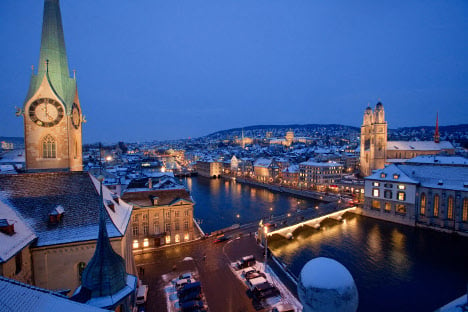COST OF LIVING
Survey: Zurich STILL most expensive city in Europe
Zurich has retained the dubious honour of being the most expensive city in Europe, according to latest Worldwide Cost of Living Survey from The Economist Intelligence Unit (EIU).
Published: 21 March 2017 12:51 CET

Photo: Swiss Tourism
The survey, released on Tuesday, aims to help companies calculate packages for expats and business travellers by comparing more than 400 individual prices across 160 products and services including food and drink, clothing, rents, transport, utility bills and recreation costs.
This year’s survey placed Singapore in the top spot for the fourth consecutive year, with Hong Kong close behind.
The only non-Asian city in the top five, Zurich is deemed the third priciest place in the world and the most expensive in Europe.
And its compatriot Geneva isn’t far behind, placing joint seventh in the world along with the French capital Paris, making them joint second in Europe.
Placing joint ninth, Copenhagen is the only other European city in the top ten, while New York is the only North American city, though it fell two places to ninth owing to a slight weakening of the dollar, said the EIU.
The inclusion of the two Swiss cities comes as no surprise, as they regularly feature highly in cost of living surveys.
Analyzing this year’s results, the EIU pointed out that the relative cost of living in the two cities had fallen slightly this year, however they remained “cemented” among the top ten.
The Swiss cities are the most expensive places in the world for recreation and entertainment, it said, “perhaps reflecting a greater premium on discretionary spending”.
Based on the US dollar and therefore subject to currency fluctuations, the survey found that the price of bread and petrol had decreased in Zurich compared with the previous year, while the price of cigarettes had gone up.
While Zurich may be expensive, it compensates by offering a high quality of life that is regularly recognized in other surveys.
Last week Mercer once again ranked Zurich the second best place in the world for expats to live in, with Geneva placing eighth.
The high cost of living is balanced by higher earnings, a good health system, quality transport links and a safe environment.
The most expensive cities in the world
1. Singapore
2. Hong Kong
3. Zurich
4. Tokyo
5. Osaka
6. Seoul
7. Geneva
7. Paris
9. New York
9. Copenhagen
Url copied to clipboard!


 Please whitelist us to continue reading.
Please whitelist us to continue reading.
Member comments